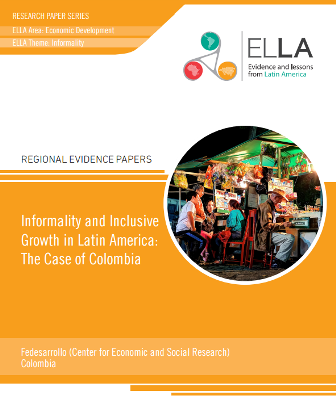Documents | Moving on with the South-South cooperation initiative by ELLA -Evidence and Lessons from Latin America- which aimes to transfer lessons and good practices between African and Latin American Think Tanks. We introduce a document written by Leonardo Villar and Cristina Fernández, executive director and senior researcher from Fedesarrollo, a Colombian Think Tank.

The study reflects on informality and its linkage with economic growth in Colombia. It introduces three hypothesis: one with informality as a constraining factor to growth, one as a promoting factor and one last that analyses the impact of lowering the payroll taxes.
One of the main conclusions of this paper is that an analysis of informality cannot be performed assuming that informal workers are a mass of individuals with similar characteristics. In fact, in Latin America informal workers range from poorly educated individuals including women heads of household and the older population, to highly educated young adults living in productive cities.
This finding corroborates new literature which points to heterogeneity in labour markets in terms of the coexistence of three types of informal workers: the ‘structural’ informal worker, for whom informality represents a default option to unemployment due to poor education, skills or experience; the ‘induced’ informal worker who is segmented from the formal labour market due to high entry restrictions or to less obvious restrictions, such as segregation; and, finally, the ‘voluntary’ informal worker who chooses to be informal.
The relationship between informality and inclusive growth is very different between these three groups. The present analysis leads to important policy recommendations that are relevant not only in Colombia but in most developing countries. Although this research does not analyse policies implemented to address informality in detail, some lessons can be drawn from the literature review relating to the appropriateness of different approaches for targeting different groups of informal workers.
Access the document “Informality and Inclusive Growth in Latin America: The Case of Colombia” here.



